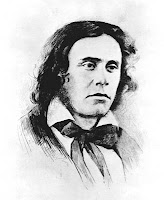The universe hangs on moral foundations...There is something in this universe which justifies William Cullen Bryant in saying, "Truth crushed to earth will rise again." There is something which justifies James Russell Lowell in saying, "Truth forever on the scaffold, wrong forever on the throne, yet that scaffold sways the future.
Martin Luther King, Jr. used these lines in his essay, "Going Forward by Going Backward," in April 1954, but he often reused the sentiment and the quotes. He references Bryant's 1839 poem "The Battlefield" and Lowell's 1844 poem "The Present Crisis." King frequently quoted Lowell in particular, including lines like "Beyond the dim unknown God keeps watch over His own."
In the 1840s, Lowell was at his strongest as an advocate for civil rights, particularly in the abolition of slavery in the United States. His poem, "The Present Crisis," remains recognized one of his greatest works and its title was later adopted for the official magazine of the NAACP (the name was chosen with its first issue in 1910, edited by W. E. B. DuBois). Elsewhere, Dr. King quoted from Lowell's equally powerful "Stanzas on Freedom": "They are slaves who fear to speak / For the fallen and the weak." As he said in 1954:
These words from the pen of James Russell Lowell are quite expressive of all that I intend to say this morning. Usually we think of slavery in the physical sense, as an institution inflicted on one group of people by another group. But there is another type of slavery which is probably more prevalent and certainly more injurious than physical bondage, namely mental slavery.
Among his other inspirations, Dr. King also often cited Henry David Thoreau and, in particular, Thoreau's essay on "Civil Disobedience." In his autobiography, he refers to first reading that essay as a college freshmen:
During my student days I read Henry David Thoreau's essay "On Civil Disobedience" for the first time. Here, in that courageous New Englander's refusal to pay his taxes and his choice of jail rather than support a war that would spread slavery's territory into Mexico, I made my first contact with the theory of nonviolent resistance... I became convinced that noncooperation with evil is as much a moral obligation as is cooperation with good. No other person has been more eloquent and passionate in getting this idea across than Henry David Thoreau.
*For this post, I am particularly indebted to an edition of The Papers of Martin Luther King, Jr., Vol. VI: "Advocate of the Social Gospel" (University of California Press, 2007), Clayborne Carson, senior editor.




















